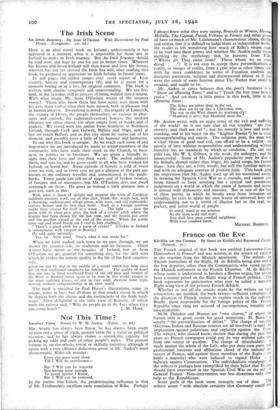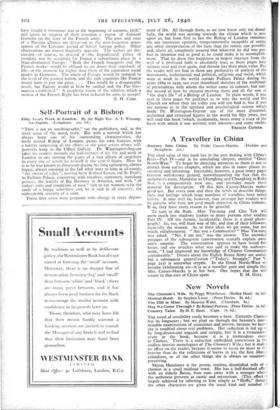France on the Eve
Kerillis on the Causes. By Henri de Kerillis and Raymond Cartier. (Putnam. 5s.)
THE French original of this book was entitled Laisserons-Nous Demembrer la France? and was written in the winter of 1938-39 in the reaction from the Munich agreement. The writers are French journalists of the Right, M. de Kerillis being also one of the few deputies, other than the Communists who voted against the Munich settlement in the French Chamber. M. de Kerlin; whose name is understood to betoken a Breton origin, has always been a stormy petrel on the Right wing of French politics. This book represents by anticipation what may be called a minority Right wing view of the present French debacle.
Whether or not all the attacks made by the writers on their compatriots are justified, the book betrays sufficient symptoms of the disunion of French society to explain much in the collapse
Briefly, those responsible for the foreign policy of the French Republic since 1934 are accused of incompetence, venality and miscalculation.
M.M. Daladier and Bonnet are "two clowns," of whom the former only is given credit for good intentions: M. Bonnet is simply "the personification of defeat." The charge of venilitY (German, Italian and Russian sources are all involved) is made by implication against politicians and explicitly against the Press. The writers, who should know, declare that during the past few years no French newspaper could pay its way without subsdies from one source or another. The charge of miscalculation is made against the whole of the Left, who put their own party and professional interests and affiliations rhead of the national in- terests of France, and against those members of the Right (1ro- bably a majority) who were induced to regard Hitler bulwark against Communism. The individualistic standpoint Of the %wit= is perhaps best exemplified by their belief that Fr.,nce should have intervened in the Spanish Civil War on the sick Of General Franco. Non-intervention was less disastrous only than help to the Republicans. Some parts of the book seem strangely out of date. The writers assert "with absolute certainty that Germany could 1101
have fought a victorious war at the beginning of autumn, 1938," and quote in support of their assertion a report of General Gamelin on the state of the French army. The pros and cons of a Russian alliance are discussed in the now-forgotten atmo- sphere of the Litvinov period of Soviet foreign policy. Other observations are almost tragically apposite. The writers are dis- cussing—of course, to discard it—the hypothetical policy of avoiding war by accepting for France a subordinate place in a Nazi-dominated Europe : "Both the French bourgeois and the French worke- would be obliged to cut down their standards of life—at the moment far higher than those of the equivalent social grades in Germany. The whole of Europe would be reduced to the level of the poorest nation, and the rich countries like France would have to pay the price. . . . This would be a disagreeable result, but Europe would at least be unified and the Pax Ger- manica established." A prophetic vision of the solution which a section of the French Right has been induced by arms to accept!
E. H. CARR.































 Previous page
Previous page